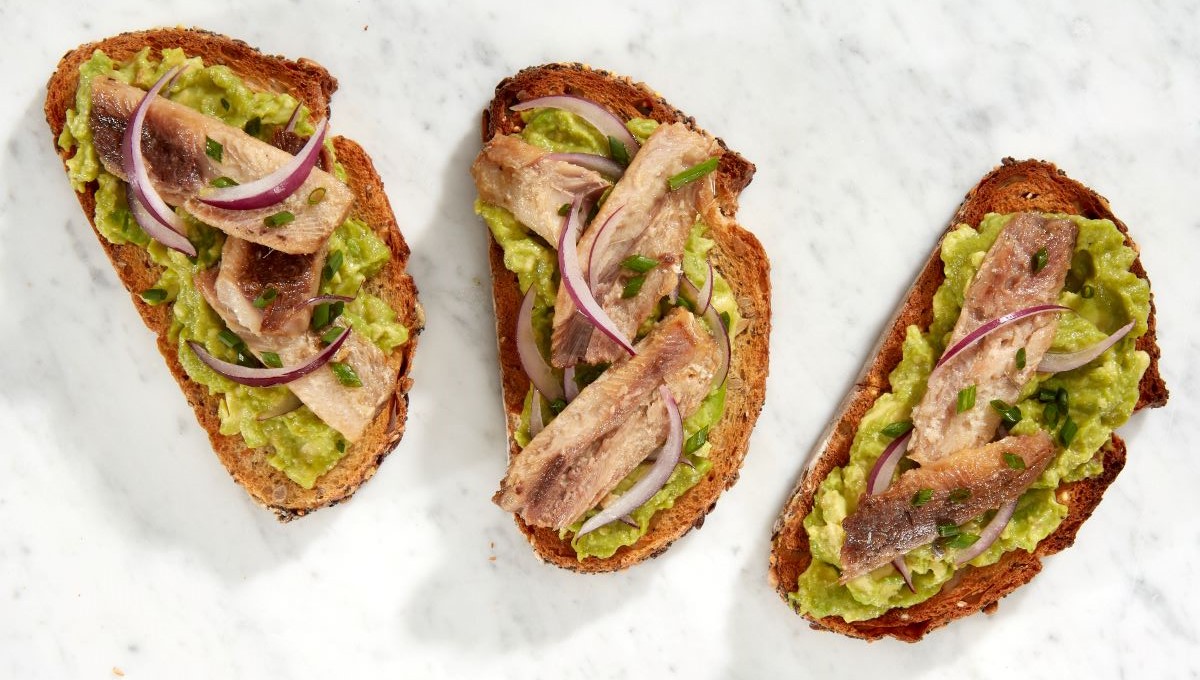Nutrition of Sardines

Canned sardines come in a variety of flavors and pair exceptionally well with other ingredients. Many people who believe they don’t like sardines have never tasted high-quality tinned varieties. Sardines are delicious and complement a range of ingredients, making them something you can eat for breakfast, lunch or dinner — especially when you consider the health benefits.
Sardines are a rich source of sustainable protein, packed full of essential vitamins and minerals and loaded with nutrients for your heart health and overall wellness. They’re low in calories, high in essential omega-3 fats and rich in nutrients. Let’s take a closer look at sardines’ nutrition facts and why they are so healthy.
Are Sardines Good for Weight Loss?
Sardines are a great source of omega-3 fatty acids, which can reduce inflammation and prevent overeating. They are considered a lean protein with zero sugar and carbohydrates. Sardines pair perfectly with salad ingredients and are tasty enough to be eaten as-is — no need for sauces and dressings that bump up the calories.
Learn about the nutrition of canned sardines in water per serving:
- Calories: 170
- Protein: 22 grams
- Sugars: 0 grams
- Total fat: 9 grams
- Saturated fat: 2 grams
- Carbohydrates: 0 grams
- Fiber: 0 grams
Top 10 Health Benefits of Sardines
Sardines are convenient, delicious, nutritious and versatile. The benefits of eating sardines every day are plentiful.
1. Loaded With Calcium
Bone-in sardines in particular are high in essential vitamins and minerals, including calcium. As part of a healthy diet, calcium helps:
- Build and maintain strong bones and teeth.
- Regulate muscle contractions, like heartbeats.
- Ensure healthy blood clotting.
A lack of calcium can cause rickets in children — and the weakening of bones and osteoporosis in later life.
2. A Rich Source of Protein
Ounce for ounce, sardines deliver more nutrition than larger protein sources. The average can of sardines has up to 23 grams of protein, which is an essential component of muscles, bones, skin and cartilage. You need protein in your diet to help your body make new cells and repair existing ones.
Protein is also great for weight loss because:
- It reduces the hunger hormone.
- It boosts satiety hormones, making you feel full and satisfied.
- It boosts your metabolism and increases fat burning.
3. Packed With Omega-3 Fatty Acids
Sardines are filled to the fin with omega-3 fatty acids that are essential for heart health. Canned sardines contain two valuable marine varieties of omega-3:
- Eicosapentaenoic acid (EPA)
- Docosahexaenoic acid (DHA)
Omega-3 fatty acids are essential nutrients that you should get in your diet daily. Potential benefits include:
- Improved heart health: Omega-3 fatty acids lower triglyceride levels in your body. Too many triglycerides in your blood increase the risk of stroke and heart disease.
- Reduced health risks: Omega-3 may help minimize the risk of certain cancers, blood clots, dementia and Alzheimer’s disease. It also has the potential to help increase good cholesterol and lower blood pressure.
- Boosted skin and hair renewal: Omega-3 may accelerate wound healing, stimulate hair growth and reduce hair loss.
4. Lower in Mercury and Other Contaminants
Canned sardines are lower in mercury and other contaminants than larger predatory fish like tuna. Mercury is a heavy metal that can cause a range of health issues when consumed in high amounts:
- Poor brain function
- Anxiety and depression
- Heart disease
- Impaired infant development
You can decrease the amount of mercury and other contaminants you consume by switching to smaller fish varieties like sardines, mackerel and anchovies.
5. Convenient for an Active Lifestyle
Canned sardines offer convenience along with their health benefits:
- Portability: Whether camping or going to work, a can of sardines can easily fit in a handbag or suitcase. Tinned sardines are light, compact and protected.
- Wide availability: You can buy sardines in stores and at various sites online.
- Versatility: Sardines are delicious on their own, in salads, in pasta and with vegetables.
Bring sardines with you on the go and use them to add variety to a healthy diet.
6. Shelf-Stable for Food Safety
Depending on storage conditions, canned sardines have a long shelf life of five to seven years when packed in oil and water and three to five years when packed in sauce. The long shelf life means you can stock your pantry as it suits your budget and enjoy the tasty fish at your convenience. You don’t have to freeze the tins to keep them fresh, which means there’s no chance of freezer burn and resulting waste.
7. Rich in Selenium
Canned sardines are packed full of nutrients and can boost your overall health when consumed daily. They’re rich in selenium, an essential component that helps make DNA and protect your cells from infections and damage. Selenium also assists with metabolism and thyroid hormones.
8. Chock Full of Iron
Sardines are a good source of the iron your body needs. Consuming the right amount increases your energy levels, promotes better athletic performance and supports your daily body processes.
9. Packed With Potassium
All your body tissues require this essential mineral, and you can find it in sardines. Potassium supports normal blood pressure, assists muscle contraction and helps maintain fluid balance in cells.
10. High in Vitamin D
Sardines are a superb source of vitamin D, which is a fat-soluble vitamin that helps your body:
- Absorb and retain calcium and phosphorus.
- Build healthy bones and teeth.
- Reduce cancer cell growth.
- Control infections.
- Reduce inflammation.
- Strengthen its immune system.
Vitamin D is an essential component of a healthy diet.
Types of Canned Sardines From Season
Our canned sardines come in a range of flavors and three main varieties:
- Skinless and boneless: This variety of sardines is a heart-healthy staple and a cornerstone of healthy diets worldwide.
- Bone-in: Bump up the calcium and omega-3 intake with bone-in sardines. This variety has bones and skin, adding extra nutrients — and because sardines are so meaty, you hardly notice them.
- Brisling: These smaller sardines, known as sprats, are tiny and delicious. They contain as much nutrition as bigger sardines and come lightly smoked for a rich flavor.
Our skinless and bone-in sardines are wild-caught off the Moroccan coast in the Atlantic Ocean. The brisling sardines are wild-caught off the Latvian coast in the Atlantic.
The Best Recipes for Enjoying Sardines Daily
Sardines are healthy and can be used in various ways to elevate a meal. Explore some delicious ways to enjoy them:
- Avocado toast: Keep breakfast or brunch simple with sardines and avocado on toast.
- Italian fisherman’s stew: Make a hearty sardine and tomato-based stew for lunch or dinner.
- Mexican salad stuffed avocados: For a healthy and easy way to enjoy sardines, serve this colorful salad in avocado halves.
- Fra diavolo: Spaghetti or linguine with sardines is a crowd favorite that’s easy to whip up during the week.
- Spanish paella: Sardines in paella offer an inexpensive and hearty way to enjoy the traditional dish.
- Sandwiches: Sandwich the sardines between generous slices of lightly toasted panini bread and serve with peppers, sprouts and chipotle mayo.
- Egg rolls: Elevate your egg rolls with sardines, shredded cabbage and tangy sauce.
- Crabcake alternatives: Make your own sardine cakes and serve them in a sandwich or paired with a yummy sauce.
Good for You and the Planet
Eating sardines has health benefits for you and perks for the planet. Canned sardines are smaller and are more sustainable than predatory fish like salmon and tuna.
If you buy your sardines from a company that values sustainability, you can rest assured that the marine ecosystem is considered. Season ensures their sardines are certified wild-caught with nets that eliminate bycatch and minimize ocean bed disturbance.
Ready to Boost Your Nutrition Levels?
Season has been offering premium quality sardines and canned seafood for over 100 years. Our sardines are sustainably sourced, and they come in a variety of delicious flavors. Give your nutrition levels and taste buds a boost and shop Season sardines today!
